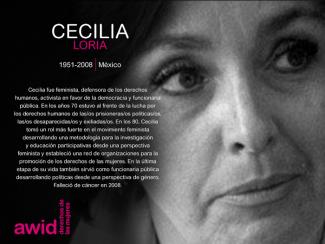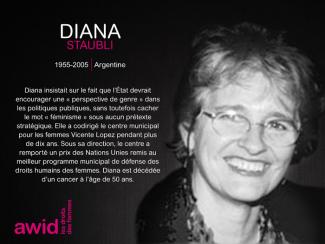El marco para la investigación te servirá de guía durante todo el proceso y el documento que elabores para especificar ese marco también puede servirte como nota conceptual para compartir con las personas a las que consultes, con las organizaciones con las que te asocies o como propuesta de financiamiento para presentar a posibles donantes.
En esta sección
Antes de realizar una investigación:
Es posible que el marco de la investigación vaya cambiando con el tiempo, a medida que vayas puliendo las preguntas y obteniendo nueva información. Pese a eso, contar con un marco de referencia inicial para la investigación te ayudará a trabajar sobre bases más sólidas.
Para dotar a la investigación WITM de una base sólida, es importante que tengas claro lo que esperas lograr.
Por ejemplo: una meta de la investigación global WITM de AWID fue aportar información precisa para demostrar lo que ya sabíamos a partir de anécdotas, es decir, que las organizaciones por los derechos de las mujeres tienen mucho menos financiamiento del que necesitan. Pensamos que contar con esa información nos permitiría estar mejor posicionadas para influir sobre las decisiones que toman las financiadoras.
Algunas metas que podrías proponerte:
- Generar información ‘dura’ sobre la realidad del financiamiento y sus tendencias, que permita comprobar o descartar algunos mitos vigentes.
- Conocer con mayor profundidad cuáles son las diferencias entre lo que perciben lxs donantes y las organizaciones por los derechos de las mujeres.
- Influir sobre los apoyos que otorgan lxs donantes.
- Aportar ideas importantes a los principales debates acerca del financiamiento.
- Explorar la colaboración entre donantes y organizaciones por los derechos de las mujeres en aspectos surgidos de la investigación.
Volver al comienzo
Preguntas principales
Enmarca el proceso de investigación con un conjunto de preguntas principales a las que solo tu investigación pueda dar respuesta y limítalas a un período determinado (p.ej. los últimos cinco años, el año pasado, etc.)
Para tener en cuenta:
- ¿Acerca de qué quieres saber más? (defínelo con precisión). ¿Qué hipótesis te gustaría poner a prueba? Poner esto por escrito te ayudará a pensarlo mejor.
- ¿Ya hay investigaciones sobre el mismo tema? Si ya existen, tal vez no tenga sentido hacer una nueva investigación WITM a menos que consideres que las que ya existen no son lo suficientemente amplias o específicas.
- ¿Qué período quieres cubrir en el análisis? Por ejemplo: en la investigación, ¿analizarás solo el año anterior, o varios años previos, por ejemplo, los últimos cinco años?
- ¿Piensas repetir la encuesta para recoger información en el futuro?
Elegir un marco temporal específico para la investigación te puede aportar resultados más precisos que si trabajas con un marco temporal abierto. Decidir si vas a repetir o no esta investigación a intervalos regulares te permitirá fijar parámetros para la recolección de datos que permitan replicarlos y compararlos fácilmente entre un período y otro.
Las principales preguntas que guiaron el proceso de investigación WITM de AWID fueron:
- ¿Cuál es la situación actual en cuanto a sostenibilidad financiera de las organizaciones de mujeres en todo el mundo?
- ¿Qué tendencias externas e internas influyen en las decisiones de lxs donantes en cuanto al apoyo para organizaciones y movimientos de mujeres?
Volver al comienzo
Tipos de información
Ahora que ya decidiste cuáles serán las preguntas principales, puedes determinar qué tipo de información te servirá para responderlas. Esto a su vez te ayudará a planificar el resto del cronograma de la investigación WITM.
Por ejemplo, ¿vas a realizar una encuesta que abarque a una amplia porción de la población que hayas fijado como prioritaria? ¿Vas a analizar las solicitudes que están recibiendo las financiadoras y que provienen de una determinada región? ¿Vas a realizar también entrevistas (te recomendamos que lo hagas)? Cuando ya sabes qué tipo/s de información necesitas, puedes buscar fuentes externas que puedan aportártela desde el comienzo mismo del proceso y planificar el cronograma de acuerdo a eso. Algunas fuentes de información sugeridas son las siguientes:
- Encuestas creadas por ti para organizaciones por los derechos de las mujeres y donantes;
- Información sobre solicitudes recibidas y apoyos otorgados por donantes;
- Entrevistas con activistas, organizaciones y donantes destacadxs
- Información proporcionada por organizaciones de membresía que reúnen a donantes, como la Foundation Center [Centre de Fundaciones] (sitio en inglés) o grupos regionales o nacionales de donantes.
Contar con una variedad de información es una buena manera de generar análisis sólidos y profundos.
Por ejemplo, la información recogida en la Encuesta Global 2011 de AWID (en inglés) constituyó el eje central de nuestro análisis más reciente. Pero también obtuvimos información de entrevistas e interacciones con distintxs actores de este campo, desde donantes hasta activistas y organizaciones por los derechos de las mujeres.
Volver al comienzo
Productos finales
Además de permitirte fijar un cronograma, formular un plan inicial acerca de los productos que vas a elaborar también te ayudará a decidir qué recursos vas a necesitar.
Por ejemplo, ¿solo vas a producir un informe extenso o también infografías, folletos y presentaciones? Según los productos que decidas elaborar, tal vez necesites contratar a una empresa de diseño, planificar eventos, etc.
Estos productos también serán las herramientas que utilizarás para alcanzar las metas, por eso es importante tenerlas presentes. Por ejemplo, tu investigación WITM, ¿está pensada solo como una herramienta de incidencia para influir sobre donantes? En ese caso, necesitarás productos que te permitan una mayor interacción con ellxs.
Algunos ejemplos de posibles productos:
- Un informe extenso para difundir entre lxs principales donantes y organizaciones.
Las investigaciones WITM de AWID siempre han tenido como principal producto un informe extenso, a partir del cual AWID elaboró otros productos más breves, que se mencionan aquí debajo.
- Infografías para difundir en forma viral en línea;
- Una secuencia animada que muestre los resultados principales;
- Uno o varios folletos breves con los principales resultados y mensajes;
- Artículos y mensajes en blogs acerca de los principales resultados, para despertar interés en el informe más extenso;
- Seminarios presenciales o virtuales para presentar los resultados.
Volver al comienzo
Conclusión: Darle un marco a la investigación te permitirá contar con un panorama general
Elaborar un marco para la investigación que incluya las metas, preguntas principales, tipos de información y productos finales te ayudará a producir un cronograma bien planificado, preparar por anticipado los recursos que necesitas y estimar un presupuesto realista.
Todo esto te facilitará los vínculos con lxs sociaxs externas y podrás ser flexible cuando ocurran contratiempos.
Paso previo
1. Concentra los recursos
Paso siguiente
3. Diseña la encuesta



















